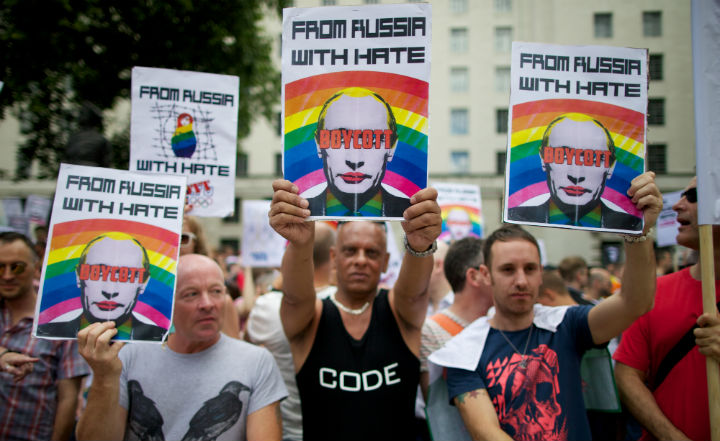VANCOUVER – Russia won’t arrest any gay, lesbian, bisexual or transgender Olympic athletes or fans this winter, so long as they don’t promote homosexuality.

A Russian government official has again spoken out about the uproar over plans to enforce the law, said to protect minors, during the Sochi Games in February.
According to Russia’s Ria Novosti, the country’s Interior Ministry issued a statement about the situation on Monday.
The news agency – one of Russia’s largest – also quoted Alexander Zhukov, Deputy Prime Minister and head of the National Olympic Committee as saying competitors “of nontraditional sexual orientations” have nothing to fear as long they aren’t promoting homosexuality.
Read more: Gay men who fled Russia seeking refuge in Vancouver
“If a person does not put across his views in the presence of children, no measures against him can be taken,” Zhukov said.
The comments were likened to the former U.S. Army’s “Don’t Ask, Don’t Tell” policy, which allowed gay and lesbian people to serve in the military as long as they did not openly discuss their sexual orientation.
The difference is that it’s not just a matter of saying out loud that you’re lesbian, gay, bisexual or transgender (LGBT). The propaganda law, passed in June, makes it illegal to promote “non-traditional relationships.” Some people fear this includes acts such as waving rainbow flags, holding rallies or openly discussing same-sex relationships and LGBT rights.
The law sets fines of up to 5,000 rubles ($156 CAD) for individuals and one million rubles ($31,261 CAD) for organizations convicted of violating it. Punishments are more severe for promotion on the web or in the media: up to 100,000 rubles ($3,126) for individuals and up to one million rubles for organizations.
Foreign citizens found to have violated the law can be punished with fines of up to 100,000 rubles, up to 14 days in prison, deportation and denial of reentry into Russia.
WATCH: Olympic medalist Jon Montgomery speaks out on Sochi controversy
Sports Minister Vitaly Murtko riled international opponents of the law when he said last week the law would be enforced during the Sochi Games.
The International Olympic Committee (IOC) asked the Russian government for clarifications on the law, after saying the Kremlin had given the committee reassurances about the legislation.
But on Monday, one IOC executive board member C,K. Wu told reporters Russia must understand “in the Olympic charter it says very clearly sports is a human right.”
Talk of the propaganda law being enforced during the games prompted LGBT groups and supporters to call for a boycott of the games or for the event to be moved to another city.
Read more: George Takei speaks to Global News about Sochi Olympics petition
Read more: Entertainment world leads outcry over anti-gay laws in lead-up to Sochi Olympics
Wu addressed the possibility of the Olympics being moved – something the IOC has said would be impossible – by saying he would take a firmer stance on considering the human rights records of future bid cities, if he is elected as president in September.
WATCH: Pressure continues to mount on Russia over strict anti-gay laws
Russia is also set to host the 2018 FIFA World Cup.
FIFA – the soccer world’s governing body – has also raised concerns about what the law would mean for players and spectators.
But in a statement on Tuesday, FIFA said it believes Russia’s commitment to “provide all visitors and fans with a warm welcome and ensure their safety.”
“FIFA trusts that the 2018 FIFA World Cup hosts will deliver on this promise,” the statement said.
An article by The Canadian Press also noted on the same day FIFA announced Russia as the host of the 2018 World Cup, it announced Qatar – a country where homosexual acts are against the law – as the 2022 host.
– With files from The Canadian Press and The Associated Press




Comments